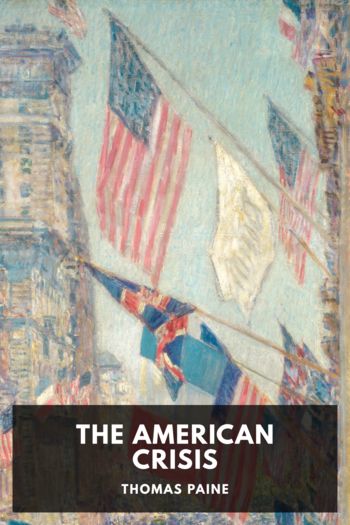Fateful Lightning: A New History of the Civil War & Reconstruction, Allen Guelzo [best thriller novels of all time txt] 📗

- Author: Allen Guelzo
Book online «Fateful Lightning: A New History of the Civil War & Reconstruction, Allen Guelzo [best thriller novels of all time txt] 📗». Author Allen Guelzo
The most important change in the shape of the postwar American economy was organizational rather than industrial or agricultural; but not only did it have nothing to do with the Civil War, it would probably have emerged on its own, war or not. That was the swift rise to dominance of the corporation. Before the Civil War, only about 7 percent of American manufacturing was organized in corporations (which is to say, as business enterprises too large to be successfully owned and managed by an individual or family, but owned indirectly by shareholders through the purchase of stock, managed by a cadre of professional administrators, and overseen by boards of directors who reported to the shareholders). By 1900 corporations accounted for 69 percent of all American manufacturing; between 1897 and 1905 alone, 5,300 small-scale firms were consolidated and reorganized into just 318 corporations, and 26 super-corporations (or trusts) controlled 80 percent of major American industrial output. Standard Oil of Ohio, chartered in 1870, was converted into a trust in 1882, by which time it controlled more than 90 percent of American oil refining.13 “Now,” warned James A. Garfield in 1874, “a class of corporations unknown to the early law writers has arisen, and to them have been committed the vast powers of the railroad and the telegraph, the great instruments by which modern communities live, move, and have their being.”
The modern barons, more powerful than their military prototypes, own our greatest highways and levy tribute at will upon all our vast industries. And: as the old feudalism was finally controlled and subordinated only by the combined efforts of the kings and the people of the free cities and towns, so our modern feudalism can be subordinated to the public good only by the great body of the people, acting through the government by wise and just laws.14
Not free labor and independent ownership, but “Industrial Feudalism” (in Garfield’s phrase) now looked like the future. And along with that feudalism arrived a population of industrial serfs. Large-scale corporate organization made possible large-scale industries, and they in turn drew more inexpensive immigrant labor through America’s ports than the territories could easily absorb. Annual immigration, which in 1860 amounted to approximately 150,000 people, had swelled by 1880 to 450,000 per year, and the urban centers of the industrializing North gradually turned into dependent, wage-earning metropolitan anthills. The staggering new scales of labor and production made the prewar slogans about free soil, free labor, and free men sound quaint rather than compelling. After the war, “I found that I had got back to another world,” said the title character of William Dean Howells’s novel The Rise of Silas Lapham, who had survived a wound at Gettysburg, “The day of small things was past, and I don’t suppose it will ever come again in this country.”15
The American generation that inherited this bleak landscape despised itself as no other American generation since. Samuel Clemens and Charles Dudley Warner tagged it the “Gilded Age,” meaning that beneath its glittering appearance of success, it had a soul of lead. The novelists and poets cried out first, initially in pain but gradually in disgust. Walt Whitman recalled with desperate fondness the nobility of the wounded soldiers he had met while volunteering in Washington’s wartime hospitals. But the vulgarity of the peacetime decades filled him with horror. “Never was there, perhaps, more hollowness at heart than at present, and here in the United States,” Whitman complained in Democratic Vistas in 1871. The results of the war had made people skeptical of noble causes and wearily tolerant of stupidity, greed, and fraud. “In business (this all-devouring modern word, business), the one sole object is, by any means, pecuniary gain.” The up-and-coming novelist Henry James complained archly in 1879 that America was a landscape of cultural desolation:
No sovereign, no court, no personal loyalty, no aristocracy, no church, no clergy, no army, no diplomatic service, no country gentlemen, no palaces, no castles, nor manors, nor old country-houses, nor parsonages, nor thatched cottages, nor ivied ruins; no cathedrals, nor abbeys, nor little Norman churches; no great Universities, nor public schools—no Oxford, nor Eton, nor Harrow; no literature, no novels, no museums, no pictures, no political society, no sporting class.16
Henry Adams, the grandson of John Quincy Adams and great-grandson of John Adams, was enraged at what he saw as the betrayal by government of the public trust his ancestors had handed down. He depicted postwar government as cesspool of selfishness: of government contractors amassing corrupt fortunes, of cynical politicians selling their votes to the highest bidder, of railroad moguls who used federal subsidies to crush out small-scale competition and buy the silence of federal officials. Adams carried his contempt all the way to the desk his grandfather and great-grandfather had occupied, that of the president of the United States, Ulysses S. Grant. “Grant’s administration outraged every rule of ordinary decency,” Adams complained; it was corrupt, visionless, and helpless. Grant himself was “inarticulate, uncertain, distrustful of himself, still more distrustful of others, and awed by money.” He should, Adams raged, “have lived in a cave and worn skins.” Mark Twain had more tolerance for Grant, but he was unsparing when it came to the financiers. “In my youth there was nothing resembling a worship of money, or of its possessor, in our region,” Twain wrote in his unpublished Autobiography; “no well-to-do man was ever charged with having acquired money by shady methods.” Once, “people had desired money,” but the corporation “taught them to fall down and





Comments (0)